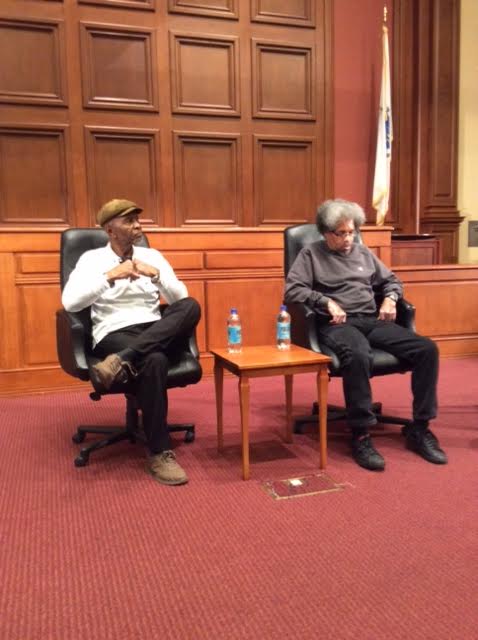Robert King (left) and Albert Woodfox at Harvard Law School on March 8th
If you want to get perspective on your life, I suggest you spend an evening listening to Albert Woodfox and Robert King.
Woodfox, who spent 43 years and 10 months in solitary confinement, and King, who spent 29 years in solitary, were two of the Angola Three housed at the notorious Angola Penitentiary (formerly Angola Plantation) in Louisiana. The third member, Herman Wallace,died in 2013, days after being released.
Certainly you can read about them. Just this year, the New Yorker had an amazing piece on Woodfox. But hearing them speak, and feeling the hope still in their hearts is enough to make most of us think twice about not getting to work on time, missing a party, or gaining a few pounds.
Most amazing is not just that they found ways to make their lives have meaning while thrown into one of the worst prisons in the country. Housed in solitary, the men said specifically because of their beliefs as Black Panthers, they found ways to educate themselves and others. They were eloquent as they spoke about their experiences and the power of organizing for racial and economic justice.
King said his political education started on the tiers where, at the time, they had solitary cells with some bars instead of what is common today, closed door rooms. Helping others, King and Woodfox found ways to “talk and shout down the tier, give each other magazines, and educate some of the men to read and write.”Reading Marching to a Different Drummer, King realized that one person could make a difference. He said, “I learned about my innate capacities and my sense of goodness.”
Woodfox said that he would like to be remembered not just for being in solitary, but for the work he has done which others have called “modelling a moral code.” He spoke at length about prisons as a place where slavery clearly exists. For example, he said that the guards “fed us in a manner they fed dogs.” The men worked to change this at Angola and did. They went on a 45 day food strike and drank water only. The point was to get their food put on a tray on a little shelf in a way the men felt was respectful. They achieved that goal. They also stopped what Woodfox called “sexual slavery” in the prison.
Woodfox said that solitary confinement is an “unnecessary evil which exists because society sanctions it,” King added, “You do not have to violate a law in prison to get put in solitary.” Both men felt their political affiliation and their teaching about politics were the reasons they were put in solitary. “I still have claustrophobia and panic attacks,” said King.
What kept them both alive is that they joined the struggle against mass incarceration and for freedom. “Humanity is worth any sacrifce,” said Woodfox, speaking of his love for people. He added, “Freedom is a state of mind…You can never define yourself by the system that tried to oppress you.”
Many questions came to the two men about how they maintained their mental sanity while incarcerated and how they kept up the fight in such discouraging conditions. Woodfox answered this way: “If you don’t fight at all, you are sure to lose, but if you fight back, and join with others, you might win.”
A good lesson for the age of Trump, and a clarion call to end solitary confinement.

